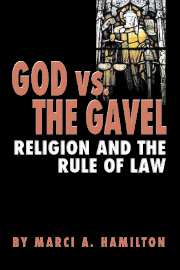Book contents
- Frontmatter
- Contents
- Acknowledgments
- Foreword, by the Hon. Edward R. Becker
- GOD VS. THE GAVEL: RELIGION AND THE RULE OF LAW
- PART ONE WHY THE LAW MUST GOVERN RELIGIOUS ENTITIES
- 1 The Problem
- 2 Children
- 3 Marriage
- 4 Religious Land Use and Residential Neighborhoods
- 5 Schools
- 6 The Prisons and the Military
- 7 Discrimination
- PART TWO THE HISTORY AND DOCTRINE BEHIND THE RULE THAT SUBJECTS RELIGIOUS ENTITIES TO DULY ENACTED LAWS
- Epilogue
- Notes
- Index
7 - Discrimination
Published online by Cambridge University Press: 24 July 2009
- Frontmatter
- Contents
- Acknowledgments
- Foreword, by the Hon. Edward R. Becker
- GOD VS. THE GAVEL: RELIGION AND THE RULE OF LAW
- PART ONE WHY THE LAW MUST GOVERN RELIGIOUS ENTITIES
- 1 The Problem
- 2 Children
- 3 Marriage
- 4 Religious Land Use and Residential Neighborhoods
- 5 Schools
- 6 The Prisons and the Military
- 7 Discrimination
- PART TWO THE HISTORY AND DOCTRINE BEHIND THE RULE THAT SUBJECTS RELIGIOUS ENTITIES TO DULY ENACTED LAWS
- Epilogue
- Notes
- Index
Summary
There is little question that “discrimination” is a dirty word in the United States, and discrimination by religious entities is counterintuitive to the prevailing notion that religion is always a force for good. Religious groups do, though, clash with the antidiscrimination laws in two primary arenas: housing and employment. This is a context where legislative accommodation has played and should play an active role in measuring the conflicting rights claims. Legislative accommodation is needed, as opposed to judicial, because making a determination whether to accommodate the religious practice, for example, of excluding unmarried couples, or to favor a right to shelter requires broad-ranging and forward-thinking analysis. No court, deciding the issue in the context of a single case, is competent to take into account all of the interests that need to be considered. The final accommodation is a complicated equation that calls for legislative reasoning regarding what the law should be and not just an interpretation of a law.
This is not to say that the courts have not imposed their view of accommodation on these issues. In the employment context, the courts crafted the “ministerial exception,” which has immunized religious employment decisions from judicial review in some circumstances. As I will discuss, there is reason to think that this accommodation is not consistent with current First Amendment doctrine. Equally, though, it is highly likely that legislatures would grant a rather similar legislative exemption for the cases involving a religious employer and religious employee.
- Type
- Chapter
- Information
- God vs. the GavelReligion and the Rule of Law, pp. 173 - 200Publisher: Cambridge University PressPrint publication year: 2005

